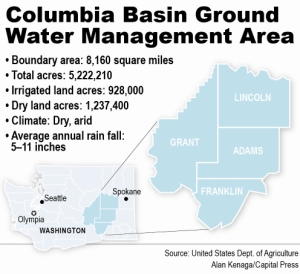forum
library
tutorial
contact

Retired Economists Find
Holes in Odessa Plan
by Matthew Weaver
Capital Press, April 25, 2014
|
the film forum library tutorial contact |

|
Retired Economists Find
by Matthew Weaver
|
'It's not going to save the farmer any operating money'
 PULLMAN, Wash. -- Two retired Washington State University agricultural economists say the plan to bring Columbia River water to Odessa area farms doesn't make financial sense.
PULLMAN, Wash. -- Two retired Washington State University agricultural economists say the plan to bring Columbia River water to Odessa area farms doesn't make financial sense.
Norm Whittlesey and Walt Butcher recently sent letters to state legislators criticizing the Odessa Subarea Special Study, completed in September 2012 by the U.S. Bureau of Reclamation and the Washington State Department of Ecology Office of the Columbia River.
At that time, the bureau and Ecology identified a preferred option to get river water to roughly 100 farmers affected by declining aquifer levels. The option is estimated to cost $730 million.
Whittlesey and Butcher estimate the capital cost of the project at $12,000 per acre. That doesn't include operations or maintenance costs, energy or interest costs, which would bring it closer to $17,000 per acre by the time the project is completed in 2025, they say.
If the area receives surface water, it would be worth $4,000 per acre, Whittlesey said.
"You don't have to be an economist to know it's not an economically viable enterprise," he said.
Bureau public affairs officer Venetia Gempler said the agency followed the prescribed process for determining the benefit-cost analysis for federal water projects.
"There are always those who believe the benefits are overstated and the cost understated, as well as those who believe the benefits are understated and the costs overstated," Gempler said. "Reclamation believes its analysis is an accurate and impartial representation of the benefits and costs for the Odessa Subarea Special Study project."
A record of decision by the bureau's regional director is still pending, Gempler said.
If anything, the bureau tends to have rather high cost estimates, said Derek Sandison, director of Ecology's Office of the Columbia River. He expects a better benefit-cost ratio than shown on paper in the special study.
Sandison expects the record of decision "any day."
Whittlesey and Butcher believe the bulk of the cost will fall to the state. They believe the project doesn't qualify for federal funding.
Former Washington Gov. Chris Gregoire included $31.7 million in her budget to initiate the expansion. Butcher said the state would have to provide at least another $500 million to bring project costs down to the point where irrigators could pay for the rest of the project.
"I think they ought to defer or delay funding until they look at it and say, 'Does the state really have any business sinking that much money into something that will benefit 50 farmers?'" he said. "If the state has $500 million to invest in something, I think we can find other things to invest it in."
Butcher said the state estimates the operations and maintenance costs would be about $150 per acre per year, close to what farmers pay now for pumping their own water.
"They will no longer have the expense of pumping, but they will have the operation and maintenance costs on the surface system, which will be about the same," Butcher said. "It's not going to save the farmer any operating money."
Even if developed, Whittlesey said, the expansion would cover about half of the 140,000 acres in need of water in the Odessa area.
Sandison called the project a "rescue mission," directed by the state legislature to replace the declining ground water with river water. Sandison said the project should not be compared with developing new irrigation for agricultural lands.
"We're having to build a system that gets to lands that are already being irrigated rather than design a system and let lands develop around it," he said. "You end up with long laterals that have to go out to reach existing farms."
Whittlesey and Butcher would like to see the groundwater managed by the original plan, with wells shut down once they reach a certain point.
Another option might be to buy the farmers out and revert the land to dryland agriculture, they said.
Butcher believes opening the East Low Canal to farmers with water service contracts who live within several miles would be a cheap source of water.
Whittlesey and Butcher hope legislators are sufficiently interested to investigate as they discuss funding for the project.
Whittlesey and Butcher have a history of speaking out against the project.
Whittlesey said he and Butcher would prefer to see state funding spent for education and health purposes or irrigation, other things that are more beneficial.
"This is not the place to do it, this is a money sink," Butcher said, noting private development has resulted in more productive irrigation efforts along the Columbia and Snake rivers.
Related Sites:
Columbia Basin Project
Odessa Sub-area Special Study
learn more on topics covered in the film
see the video
read the script
learn the songs
discussion forum
